
One of the nice things about having a lot of pots bubbling away, particularly when other people are supervising some of them, is knowing what’s coming up on the menu. So here, in no particular order, is a deeper look at three pet projects that are manifesting.
SFWA Ed will be online education via the web: an array of classes aimed at a range of writers, from new to professional. We’ve got a lot of members who teach, and I know our coordinator has been reaching out to as many as he can. That’s been rolling along splendidly thanks to the undauntable and indefatigable Jonathan Brazee. I believe it will be a mix of paid and free classes; we’re still figuring out all the details.
First Chapters is my attempt to answer the question: how can I know what to vote for in award season without reading every single book? That’s the biggest complaint I hear about any of the awards. Or one of them, now that I think about it. At any rate, this compendium will have a first chapter from eligible books, with the info you need to figure out what category or categories it fits in for awards like the Nebulas, Hugos, Norton, the Dragon Awards, etc. Using it should help someone find the books they want to read in their entirety. If you’re interested in making sure you’re contacted when we start taking chapters, please drop me a line. (If you have been asked not to contact me, please mail your interest to office@sfwa.org.) This project is rolling along thanks to the efforts of Dan Potter and the Publishing Committee.
The Preserve Your Legacy Campaign. So to talk about this one, I have to talk about a SFWA volunteer, Bud Webster, who was frickin’ tireless in working with the SFWA Estates Project, which works to connect authors’ estate with publishers, editors, scholars, etc. Bud was smart and funny and above all, kind. One of the good-hearted people that help keep the world running. This campaign is aimed at helping writers learn how to preserve their literary estate and archive their works. This one’s being driven by the excellent Lawrence Schoen.
...
 In Part One I presented a discussion between writers Steven Barnes, Maurice Broaddus, Tananarive Due, Alaya Dawn Johnson, Tonya Liburd, and Nisi Shawl about Fireside Fiction’s reports on black writers in speculative fiction. In this part I want to talk about SFWA and what it can learn or has already learned from both the report and the discussion, along with listing some of the action items I’m taking away from it.
In Part One I presented a discussion between writers Steven Barnes, Maurice Broaddus, Tananarive Due, Alaya Dawn Johnson, Tonya Liburd, and Nisi Shawl about Fireside Fiction’s reports on black writers in speculative fiction. In this part I want to talk about SFWA and what it can learn or has already learned from both the report and the discussion, along with listing some of the action items I’m taking away from it.
What’s Happened So Far
When the original 2015 report came out, we discussed it on the SFWA Board but little conclusive was achieved. I wrote about some of that discussion as well as my own thoughts.
Of the various action items the SFWA Board talked about, some have been fulfilled.
But there’s more to be done. (For example, that publishing house outreach is something I need to figure out, so my next step is asking our volunteer wrangler to find me someone to compile that list. Or the SFWA Star Project has been pretty inactive, so I need to prod around and see if someone won’t start driving it while firmly resisting the urge to do it myself.)
There is a fine line between asking for help from black writers in fixing the issue and expecting them to fix it. I still try to navigate this in addressing the issue, and with the podcast, my hope was to a) facilitate discussion that promoted awareness of the issue and b) gather information that helps me — and the rest of the SFWA Board — figure out what SFWA can/could/should best do.
Gleaning Action Items
Beyond the podcast, I looked to the original report, its follow-up, the accompanying essays, and some of the pieces it sparked in order to inform myself. This is accordingly an imperfect view and does not touch on every related piece, but I think I’ve created a decent list of things to do.
When the Fireside Fiction report came out, I was dismayed initially, and remain a bit daunted by it. For me it was hard to look specifically at this one aspect, black writers, rather than diversity issues overall. Realizing that was revelatory and only came about because of feedback that someone graciously gave me. Attitudes about class, race, gender, sexuality all play together in the make-up of our own personal filters on the world; I found it useful to try to change that filter and I’m very grateful to the essay writers as well as people who talked personally with me about the issues for their valuable time and effort.
Two black writers have been important to my own career. The first was Octavia Butler, one of my Clarion West instructors. The second is Samuel R. Delany, whose The Fall of the Towers was one of the first pieces of adult SF I read, and which inspired me to try to find out for myself all that SF could be.
One of my core beliefs is that if I’m leading an organization, I need to make sure that organization is doing what I believe to be the right thing. So what can I help SFWA do? Here are my notes.
Nisi Shawl: Ones and Twos and Rarely Threes. Shawl mentions editor Gardner Dozois telling her Clarion West class in 1992 that writing and selling stories in a particular universe is a good path to selling a novel in that universe. She references Joanna Russ’s How to Suppress Women’s Writing and makes the observation that the suppression of thought requires nothing more difficult than misunderstanding. For me that raises a question about how to recruit and train slush readers. She also notes that “you have to be printed to be reprinted.” In the podcast this came up again: for there to be better representation in the slushpile, there needs to be more black publishers, editors, and slush readers in the system.
Action item: Think about slush readers. How do we create systems that recruit widely and also teach those readers and editors to read without so many filters? (Reading these essays might be a pretty good start on that.) Figure that out, then figure out how to spread that knowledge via panels, podcasts, handouts. Slush readers and interns are where the majority of our editors and publishers come from; change at this level will spread upward and do so within a few years, particularly if we figure out ways to help first-time anthologists and newbie editors as well, perhaps simply with resources.
Brian White: A Note from the Editor of the #BlackSpecFic Responses. White’s piece is most useful to me in talking about the changes Fireside itself made in reaction to the report. They included an anonymous way to self-report when submitting, something that SFWA could adapt to its membership form. They added special submission periods aimed at specific groups. That I’m not sure about translating – an obvious way would be grants or awards aimed at those groups, perhaps, but that’s not a substitute for inclusion in the existing ones. Changing staff to be more representative is another step, and something SFWA can incorporate in its staffing and volunteer (perhaps?) process. As is amplifying and building on the discussion itself.
Action items:
Tobias Buckell: Boldly Going Nowhere. Buckell talks about Leonard Nimoy and how Spock’s mixed race character was one that Buckell could identify with himself. He notes “Getting validated is really important to us humans.” He talks about being told repeatedly that characters of color don’t sell, and looks at the numbers that he’d expect from SFWA.
Action item: How can SFWA help with validating black writers? Our annotated reading lists, handed out at places like the Baltimore Book Festival, is one place. Inventory what we have and figure out holes. Then start filling them. As a follow-up make sure this material gets into our “SFWA-in-a-box” packet that lets members run SFWA meetings/panels at local cons and events.
And while I’m at it, we should probably make sure that membership survey gets done at least every two years.
Justina Ireland: Two Percent. Ireland points out that “promoting diversity and inclusion isn’t a passive state, it’s an active one.” She debunks issues of quality and, like White’s piece, hers presents some steps: 1) support successful black authors and SF mags publishing them, 2) challenge panel line-ups (and I’d add topics, and structures, and alls sorts of practices), 3) be vocal regarding supporting and promoting black writers, and 4) make spaces welcoming and inclusive.
Action item: For me, this underscores an existing issue that’s been slowly getting better, but not fast enough: the SFWA forums. Which deserve their own, and lengthy, post, but I am postponing that until I finish setting up a meeting with the expanded moderation team and talking to them about policies.
Troy Wiggins: Speculativeness Blackness. Wiggins talks about the disappointment of science fiction, “a space defined by creating new and different realities,” not looking at racism. Racism is very much part of American culture and in the news right now – to not question it seems a retroactive move. He talks about what magazines can do: soliciting from black authors, hiring black editors (and slush readers), not using a blind submission system as an excuse, tracking submission rates, heavily publicizing and promoting stories by black authors, and openly courting stories from connected authors. This last point puzzled me a bit — did it fit into a mentorship program, perhaps? It wasn’t until I read Jemisin’s later reaction to something that happened to her after the initial report came out that it clicked for me.
Brian White: Interview with N.K. Jemisin. Jemisin is unsurprised by the numbers. She references a strong black self-published fiction segment and that intrigues me enormously, because I know we have a lot of resources that self-publishing folks will find useful. She also notes that after #Racefail, many magazines began including a statement that they were interested in diverse fiction, and that for her a magazine that lacks that is signaling an editor who is either nor current with the industry or not interested in publishing diverse fiction, including fiction by black writers.
Action item: Look at the overall magazines and see who has such a statement and who doesn’t. Publish best practices to go along with our model magazine contract.
Anonymous – We Are Writing the Future. They talk about some of the reaction and charges of flawed data, and make valid points. I love this line, “Black people are in your science fiction, writing your future.”
No action item there, just a quote to be jotted down in my notebook.
Reactions to the First Fireside Fiction Report
I looked to the second report as well as some of the pieces reacting to the report for more insight, and found the following particularly useful:
Finally, as a result of reading I began to understand that phrase “openly courting stories from connected authors” when I read about an upsurge in invitations to established black authors immediately after the first report was released. Yes. Mail established black authors not just for their stories but to get -their- lists of people we should be helping. Ask them to suggest slush readers. Let their network come into play and amplify the hell out of it.
Reactions to the Report
One of the things that happened after the Fireside Fiction report came out was that I, like a number of other figures in the field (or so I would suspect) received an email from “Lev Bronstein” saying they and a group of “editors and writers” had put together an analysis that “suggests that we can’t draw any useful conclusions from Fireside’s report.”
In reading the report, I found that they had quoted me as part of their justification for their actions, and I replied saying not to use my name in that fashion. I’m still irritated by the assumption that I’d want to be associated with the amount of privilege showcased in both that email and the essay that they briefly posted then took down as a result of the absolutely inevitable and IMO justified Internet reaction to it.
It was, alas, not the only thing that in my perception would attempt (perhaps deliberately, perhaps simply a result of the misunderstanding Shawl references) to divert, distract, or otherwise detract from the message of the report. But it would be wearisome and discouraging to begin to assemble anything reporting on that.
Yes, you can perform verbal things and come up with “no useful conclusions.” Or you can believe the voices that work together in the accompanying essays to say, Yes, this is what we’ve experienced. Yes, this is an issue. Yes, we need to change it because it is harming people and the field overall. I believe the stories I’ve been told and they hurt my heart. The friend who had an editor highly interested in her book and looking forward to working with her — until the point where they met face to face and the white editor realized my friend was black. The friends who wryly compare notes on which of the black authors they regularly get mistaken for. And I believe the lack of representation in F&SF hurts the field and deprives us of some voices with a whole lot of things to say.
Conclusions
One thing I know is that this analysis should have happened sooner. I am, alas, only one woman, and I juggle at least a dozen SFWA-related things at any given time. There’s an essay about a complaint I received regarding a Service to SFWA award that goes with this, and that will be appearing soon. The wheels of bureaucracy grind exceedingly slow, particularly when powered by volunteer labor, and SFWA has brought that lesson home to me again and again.
Making sure we are useful to members, particularly self-published ones, is important. All writers want value for their money, including black writers. A membership card and a chance to say you’re a member isn’t enough by a long shot. So here’s something about what we offer and will continue to offer, what we’re trying to accomplish, and why. A list of what I’m trying to do, and the promise that I’ll listen to — and try to understand — feedback about it.
So. I don’t have any of the answers, I think. But I’m working at moving forward. As with other SFWA-centric blog pieces, I am following my philosophy about transparency whenever possible, not just in terms of processes, but the decision making behind them. I’m happy to answer questions about any of this, and to those with toes I’ve stepped on unnecessarily, I hope you’ll let me know so I can sidestep your feet in the future.
Peace out,
Cat
#sfwapro
...
 A few days ago Steven Barnes, Maurice Broaddus, Tananarive Due, Alaya Dawn Johnson, Tonya Liburd, and Nisi Shawl were kind enough to let me record their conversation about Fireside Fiction’s reports on blacks in speculative fiction. The discussion centered specifically on what SFWA can learn from the report in order to improve/expand existing efforts as well as things it should or shouldn’t be doing.
A few days ago Steven Barnes, Maurice Broaddus, Tananarive Due, Alaya Dawn Johnson, Tonya Liburd, and Nisi Shawl were kind enough to let me record their conversation about Fireside Fiction’s reports on blacks in speculative fiction. The discussion centered specifically on what SFWA can learn from the report in order to improve/expand existing efforts as well as things it should or shouldn’t be doing.
...
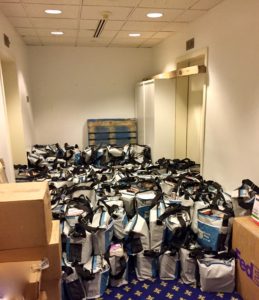
The series so far:
...

This third of a four part series about the Science Fiction and Fantasy Writers of America’s decision to admit independently published writers talks about the first wave of independent members and SFWA’s efforts to add value for those members. Here is Part One: History of the Organization and Part Two: Bringing in the Indies.
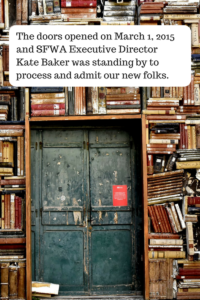 Swinging the Doors Open to Independent Writers
Swinging the Doors Open to Independent Writers
The doors opened on March 1, 2015 and SFWA Executive Director Kate Baker was standing by to process and admit our new folks. This gave us a chance to observe the new criteria that the Board had been working on for so long in action with a mind for what sort of refinements might be necessary further on down the line in order to make SFWA even more welcoming to independent and small press writers.
I was glad we’d prepped the message boards. The new forums were immediately put to use and introductions made, with plenty of delighted welcomes. There was – in my perception – no contention, only enthusiasm.
Here’s a videocast M.C.A. Hogarth did aimed at indie writers evaluating whether or not to try SFWA:
Some statistics for the number-minded:
All My Expectations of Indie SFWA Members Confirmed
As I and others had argued repeatedly, the change did not result in an influx of unqualified, affluent hobbyists trying to buy their way into SFWA, and we could, finally, put that particular straw man to rest and play taps while other straw folk were being assembled in the background.
As you can see by the numbers, it wasn’t a massive surge, but a solid number. For some people it was part of a lifelong dream. For others, it was a cautious exploration of just what SFWA had to offer them. More than anything else, these were pragmatic, working writers. In a thread on the discussion boards, people began to share their sales number in a revelatory and instructive way that emphasized what a smart move for SFWA this had been. I still inist one of the smartest moves that happened during my time with the board.
I kept meeting new members at cons, to my pleasure and delight. We began to offer more SFWA-focused programming at conventions, such as a panel about What SFWA Offers at GenCon, Norwescon, the Nebulas (that was a no-brainer), and others.
Unexpected Results from the Indie Wave
New Members Benefits — And Vice Versa
With that surge in volunteer energy came a lot of new stuff, primarily driven by Vice President Maggie Hogarth. People entered wanting to not just to connect with other members but to add their energy to the organization and help it grow to meet their needs.
Among them:
Nebula programming for the indies would be an issue both that year and the following one, with many indies feeling they were unrepresented and saying so on the discussion forums. The second year seemed to me to be partly an issue of perception and bad framing rather than actual lack: while many of the panels were aimed at indies as well as hybrid and trad pubbers, they were not marked as being of interest to indies. To my mind, they have progressed significantly each year: for me last year’s highlights included the mentoring program, the chance to hear experts talking about their wide range of expertise in office, and the fact that we managed to give everyone, including the indies, a way to have their books for sale there at the events. (Thank you Sean Wallace!)
Many existing services were already there for the new members such as the Featured Book/Artist program, the Nebula Awards, and appearances at events such as WorldCon, the Baltimore Book Festival, GenCon, and others. Other new things were applicable to all sides, such as the SFWA Speakers Bureau, introduced in early 2016 or the emerging Grants Program. I tried to make sure that indies were represented on the SFWA Recommended Reading List, and continue to do so, as do a number of other people.
All in all – things were swell, and continue to be so.
Next time, in Part Four (the final one) — what does the future hold in store? Includes talking about data from the recent SFWA member survey as well as revelation of at least one cool project designed to help people reading novels for all yearly awards, including the Nebulas, Hugos, Dragon, World Fantasy, among others. *cue mysterious music and exit*
#sfwapro
...
In part one of this series, I talked about the Science Fiction & Fantasy Writes of America (SFWA) prior to the move to bring in the independent writers. This section will discuss the decision and the process, as well as some of the reactions. My sources in putting all of this together are my own faulty memory, my personal notes, and the Internet. The discussion of the indie admission took place in a number of venues, including e-mails, blog articles and comments, social media, and the SFWA discussion forums. In drawing on the latter, I have tried to ensure that I did not violate their confidentiality rules, quoting only with permission.
Nomenclature has varied, but when I refer to independently published writers, that is the same group that others have used self-published, self-pubbed, indie, and other terms to describe. Self-publishing has been conflated with vanity publishing in the past; I believe them two distinct things.
Beginning to Recognize Independently Published Works
As far as I can tell, the question of whether people should be able to qualify for membership with independently published sales was first brought to the board by Vice President Mary Robinette Kowal in 2009. Discussion focused on a couple of points: how to translate the SFWA requirements for professional writers into ones using self-published material and whether or not the gatekeeping done by traditional publishing represented a quality bar. I’m framing that last badly, primarily because I don’t agree with it, but I can understand why, depending on their relationship with traditional publishing, someone might be invested in that view. That discussion moved on, but the question of indies had been raised and would continue to be something discussed at board and business meetings, with increasing support for allowing indies in on the part of some Board members.
...
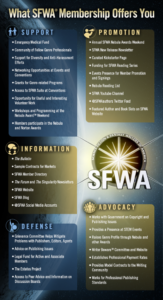 As part of a Twitter conversation, one of my favorite gamewriters, Ken St. Andre, suggested I write up something about SFWA and independent writers that goes into enough detail that people can understand why — or why not — they might want to join. This is part one of a multi-part series that will talk about some of the history behind the decision, and in this first part I want to talk about the organization prior to admitting independent writers. Part two will discuss how SFWA came to change membership criteria in order to make it possible for people to qualify for membership with indie sales in 2016, and some of the changes made as part of planning for that expansion. Part three will focus on how SFWA has changed in the intervening time, while part four will look at what I see as the changes that will continue as we move forward over the next decade. In all of this, I’m trying to provide something of an insider’s look that may or may not be useful, but certainly will be full of many words.
As part of a Twitter conversation, one of my favorite gamewriters, Ken St. Andre, suggested I write up something about SFWA and independent writers that goes into enough detail that people can understand why — or why not — they might want to join. This is part one of a multi-part series that will talk about some of the history behind the decision, and in this first part I want to talk about the organization prior to admitting independent writers. Part two will discuss how SFWA came to change membership criteria in order to make it possible for people to qualify for membership with indie sales in 2016, and some of the changes made as part of planning for that expansion. Part three will focus on how SFWA has changed in the intervening time, while part four will look at what I see as the changes that will continue as we move forward over the next decade. In all of this, I’m trying to provide something of an insider’s look that may or may not be useful, but certainly will be full of many words.
...

I cannot begin to enumerate all the ways that weekend was wonderful. It was a great joy to see months and months of planning finally bear fruit and now we can relax for at least a couple days before thinking about next year. The programming was, in my opinion, outstanding. My only quarrel would be that there was so much good stuff that I could not get to every panel I wanted to, and that I could not spend enough time with the fabulous SFWA events team of Kate Baker, Terra LeMay, and Steven H Silver, who are responsible for everything that was wonderful.
One of the challenges for the Programming Team, led by Mary Robinette Kowal, was making sure the programming had something for all writers, whether they were tradpub, small press, indie, or hybrid. There were so many terrific, in-depth panels, including a wealth of shadow programming additions and office hours with writers and other publishing professionals. It made me think back to a Nebula from several years when I was on a lackadaisical panel about writers block that was, I think, so much less useful than it could have been and realize just how far the Nebula Conference has come from the days of “let’s all get together in a hotel and hand out the awards and then drink a lot.”
...

Short version: I’ve withdrawn my story from the Nebula ballot. Many congratulations to Bonnie Jo Stufflebeam, whose excellent story The Orangery replaces it on the ballot.
Long version: One of the best parts of being SFWA President or Vice President is that you get to be one of the people calling the Nebula nominees to tell them what’s up. This is a lot of fun because giving people good news is almost always a terrific experience. I’ve ever gotten to call former students on occasion, and thought my heart would burst from joy, because that is a terrific feeling.
This year I woke on February 16, the day we would be making the calls, to find a message from our Nebula Awards Commissioner asking me to give her a call. I did, and she presented me with news that both delighted and horrified me, that my novelette, “Red in Tooth and Cog,” was on the ballot.
Delighted, because I like that story, and think it’s a good one. A number of people whose opinion I value highly have expressed praise for it, and it’s also something that represents a victory for me. I was grimly determined to be published in the Magazine of Fantasy and Science Fiction ““ it was a publication that represented an enormous milestone to me ““ and that acceptance was my 44th submission to the magazine over the course of 12 years. It wasn’t that the other stories were bad ones. One of them, “Five Ways to Fall in Love on Planet Porcelain,” even went on to become a Nebula nominee in 2013.
And horrified, because I don’t want things to look like the Nebulas are motivated by concerns other than literary excellence, and it seemed to me that this could look like that since I have engendered a little popularity while President, mainly because I am so goddamn personable. And I was sure there would be a certain amount of grumbling about it. So before we moved forward, I had to decide whether or not to withdraw it
...

Dear SFWA members:
I think a proven track record’s a pretty good credential for the Presidential position, and so I propose you let me steer for another couple years, and after that, I’m going to take a year off volunteer work. Maybe do one of the cargoship cruises.
Here’s the stuff I’ve managed to do for SFWA over the past two and a half years. You could probably go back through the various Presidential letters in The Bulletin and get better detail but here are highlights.

What to Expect From Two More Rambo Years
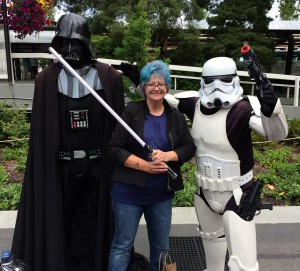
What am I hoping to get done that I haven’t already? This is a tough list because I regard the fact that a number of things aren’t farther along as a failure on my part, but here we go.
This is an update of my statement of two years ago as to why I’m qualified.
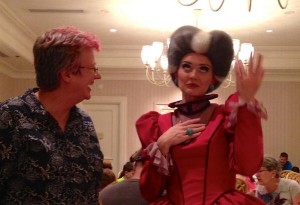
I’ve worked as both a writer and an editor. I have over 200 fiction publications, including in such places as Asimov’s, Weird Tales, and Tor.com, and five collections (four solo, one with Jeff VanderMeer). I just turned in my second novel to the publisher (Wordfire Press) and am working on the third in the series. I’m a hybrid author, working in both traditional and independent publishing.
My short story, “Five Ways to Fall in Love on Planet Porcelain,” was a 2012 Nebula nominee, while other works have been nominated for the Locus Award and the Million Writers Award. I was the editor for several years of award-winning Fantasy Magazine, receiving a 2012 World Fantasy nomination for my efforts there, and I guest-edited Lightspeed Magazine’s Women Destroy Fantasy issue. I have worked as a volunteer with multiple speculative fiction organizations, including Broad Universe and the Clarion West Writers Workshop.
I teach a popular series of online classes on writing and editing and do some podcast narration, and have written a book on how writers can best use their online presence to sell books.
I am a frequent convention-goer and make a point of organizing or participating in SFWA activities when they’re available at such gatherings. This year, I will be attending ICFA, Emerald City ComicCon, Norwescon, the Nebula Award ceremony, the Locus Awards, Worldcon, DragonCon, and FenCon.
I’m running because it seems to me in these tumultuous times people need to be stepping up and leading. If I want other people to be volunteering time, I have to show it’s a task I’m willing to take on too. If I were grading my performance over the last year and a half, it’s a solid B. I’ve done some solid stuff, but I’ve also dropped a few balls. I’d like to get some more stuff finished up before the grade is in. And, selfishly, I love the team and would miss the hell out of that weekly videocall where we touch base.
Peace out,
Cat
#sfwapro
...
Want access to a lively community of writers and readers, free writing classes, co-working sessions, special speakers, weekly writing games, random pictures and MORE for as little as $2? Check out Cat’s Patreon campaign.

"(On the writing F&SF workshop) Wanted to crow and say thanks: the first story I wrote after taking your class was my very first sale. Coincidence? nah….thanks so much."

(fantasy, novelette) She was thinking complicated thoughts now, about things she was not sure that dryads ever contemplated: what it would be like to take an axe to a sailor, to cut a human down as they had cut her tree down. Sometimes they were so close. But there were so many of them, and she was chained.


This site is protected by reCAPTCHA and the Google Privacy Policy and Terms of Service apply. This site is a participant in the Amazon Services LLC Associates Program, an affiliate advertising program designed to provide a means for sites to earn advertising fees by advertising and linking to Amazon.com.